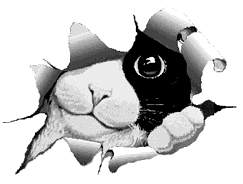In the first part of this series, we talked about the transnational effects of the Dutch Wilders hysteria against Muslims. And how it is exploited and financed by foreign sources like the Advocacy Project of Daniel Pipes in the U.S.A. and Israel. We will have to return to the international financing problem as well as to the ongoing European contamination, in one of the next instances.
 "Geert Akbar": The some 200 activists who supported Wilders on January 20 at his Amsterdam court appearance, were not without some humour...
"Geert Akbar": The some 200 activists who supported Wilders on January 20 at his Amsterdam court appearance, were not without some humour... Our subject here, in the second part, is the typical Dutch background of the hysterical Wilders upsurge. The Wilders phenomenon has nothing to do, in our opinion, with the Islam. Any religious, ethnic or cultural intrusion into the dream of a peaceful and quiet Dutch society, could have done the job. Wilders is not about Islam. It is about xenophobia. And hate-mongering.
Redundant workers are left alone
As many researchers and thinkers nowadays understand, the globalization of economy, trade and culture are felt as an intrusion into their daily life, by the men and women who live in marginalized parts of Western cities. Structurally, they are no more needed for production of goods. (See my articles about the rise and downfall of the need for urban workers at the e-urban site: Les quartiers relégués... (FR), Missbrauch der Geographie des Armuts.. (DE).
Foreign, mostly Muslim, immigrants take the jobs of the former local (former generation) immigrant workers. And the new immigrants are in their turn put aside, as their wages get too high, compared to those in, for instance, China. But China is over their horizon. The local inhabitants only see their immigrant neighbours.
And that is hard. Welfare State has, since a century, taken responsibility for the citizens' well-being, their security and their peaceful life, taking the place of the Church and the heads of the village communities. And it is felt, that the State fails. Nobody is really left alone. But life has become pointless. Strangers are coming in. They take our houses, our schools, our local shops. The State does nothing against it. Frustration becomes aggression against the newcomers and their children: headscarves, minarets, halal slaughtering are symbolical targets.
How is it possible, that an open, tolerant, society like the Dutch, reacts so strongly against the newcomers?
The Dutch tolerance is an "empty tolerance" as in: "De Lege Tolerantie", a book, published in 2007 by a number of Dutch thinkers and writers. It is empty, for it is in fact a way of hiding within one's own community.
It was developed during Middle Age and the early Modern Times. As a small country, the Dutch republic, in its summit of power, received the Flemish refugees from Antwerp and made them the top of Lowlands' culture (notably Joost van den Vondel, poet). Sepharade refugees from the Iberic countries were welcomed, as new traders on the world markets. Baruch d'Espinoza, one of them, was condemned to isolation, by the Sepharade court, confirmed by Dutch justice. The Jews had to manage their own problems.
As long as immigrants did not endanger Dutch elites' relations to England or to France, they were welcome. Not in the countryside, but in the cities. When the 18th century was nearing its end, Dutch "Patriots" demanded a Democracy in Holland. Second-class citizenship rules for Jews were to be abolished. But, finally, full-fledged discrimination was reestablished under the "Restoration" regime, which lasted from 1814 to 1830.
In the second half of the 19th century, the country accumulated its riches from its colonial possessions, the Netherlands Indies, i.e: Indonesia. Typical Dutch "tolerance" was developed into an ideology of "inspraak", "giving your opinion", imposed upon Indonesian leaders. "Inspraak" is not about real policies. It deals exclusively with social issues. It was a check on how far Dutch authorities could go in their exploitation of Indonesia.
The imperial illusion
While the British left the Indonesian wealth to their Dutch clients, those last ones lived with the illusion of an imperium. Holland considered itself both as a world player and as a small reserve of peace and civilization. It did not take part in the First World war, it only profited largely from trade with both sides. The German Nazi occupation in 1940 was a shock, but was relegated into shameful oblivion afterwards.
Dutch society reacts to foreign arrivals with tolerance. But what does Dutch tolerance mean? It is not about accepting, but about leaving alone. Leave us alone. Manage yourselves. The well-known "pillar" structure of the Dutch nation is its outcome: catholics, protestants, conservatives and social-democrats have each their own "pillar" under the state. It consists of social, educational, cultural and political organizations, whose tops negotiate all the time compromises with the other pillars, in order to keep the state going.
The emptiness of Dutch tolerance
Secularization, death of ideologies, dealt a mortal blow to that system from the sixties on. So mortal, that there can be no question of a new Dutch "islamic" pillar now, at the start of the 21st century. Which leaves Dutch society with a fundamental destabilization. The "inspraak"-strategy, so successful with the Indonesian elites, doesn't work with the new immigrants. Denial, until the middle of the nineties a favored attitude among the political elite of the country, became impossible after the tumultuous passage of Pim Fortuyn, murdered in May 2002.
In short: Dutch society is without a clue. Traditional elites are either hiding behind their pillar walls, or expecting the fall-out of Fortuyn- and Wilders-like racist movements to fall into their laps. That is why Parliament and traditional parties (for the most part) let Wilders do his thing. Hoping, that somebody would dare to come forward and put him in the right place. At this moment, it is a part of the Dutch judiciary system, who are coming forward against Wilders' hate-mongering. There is little or no support from the political side. Everybody is commenting as if it were a match between two foreign soccer teams.
Strangers to the new European community
The structure of the European Union, a hybrid hesitating between a common civilization and a loose union of independent nations, does not help. Dutch citizens, in their majority, do not feel responsible for the European common good. As the traditional parties do not work to engage citizens with an European project in the world, demagogues like Wilders, find an ample room to play with the illusion of a Dutch "Alleingang", as if the country were still an imperial power. Wilders copies the model of the ex-maoist populist Dutch "Socialist Party" in the European Parliament, who sabotaged during many years all European construction.
A commenter on this blog, rightly said, that a Wilders movement would not be possible in the bigger European countries like Britain, France, or Germany. But, as the EU is composed, now, of 27 countries, a destabilization of one or more of the smaller ones, like Poland, Denmark, Ireland, Italy, Greece or Holland, could contaminate the whole process of European unification.
2007, a financial support for the Irish movement against the Lisbon Treaty, channeled through a military contract with the US State of Georgia, and managed by the American Heritage Foundation, succeeded in endangering the whole project. The US funders behind Wilders may have the same intention.
That is why not only the Dutch, but all people of the EU should be worried about the fragility of democracy, as illustrated by the destructive Wilders phenomenon in Holland, and its hidden sponsors from abroad.
(From At Home in Europe (EN) and Huibslog)
Please; comment at: At Home in Europe - Euractiv, where this post is republished!




No comments:
Post a Comment